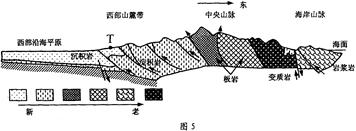问题
选择题
图5为纬度20°—35°大陆东部某岛屿的地质剖面图,完成问题。

小题1:该岛屿上变质岩主要分布在东部的主要原因是
A.位于板块生长边界附近,受岩浆活动和岩层拉张影响大
B.位于板块消亡边界附近,受岩浆活动和岩层挤压影响大
C.断层发育比西部多,岩层受地壳的水平运动影响大
D.断层发育比西部少,岩层受地壳的垂直运动影响大小题2:城市T的年均降水量约为1720mm,冬雨比例为22%,其冬季降水较多的原因是
A.沿岸暖流增温增湿作用
B.西北季风受海洋增温增湿后遇地形阻挡
C.位于中央山脉的背风坡
D.来自海洋盛行西风受地形阻挡多地形雨
答案
小题1:B
小题2:B
试卷分析:
小题1:根据图示信息判断,该地质坡面图为台湾岛。图示东部为变质岩和岩浆岩为主,说明明显受到内力作用,应为板块的挤压和碰撞的结果,形成的板块边界类型属于消亡边界。
小题2:北半球大陆东部的岛屿受季风影响明显;T地位于山脉西侧,为夏季风的背风坡,导致了夏雨的比例不高,冬季风经西侧的海洋后,带来了水汽在西侧形成偏北风的迎风坡,故冬季降水量较大。
点评:本题解题的关键是能利用图示信息,对降水的原理、地壳运动等地理原理的理解把握和应用能力。
